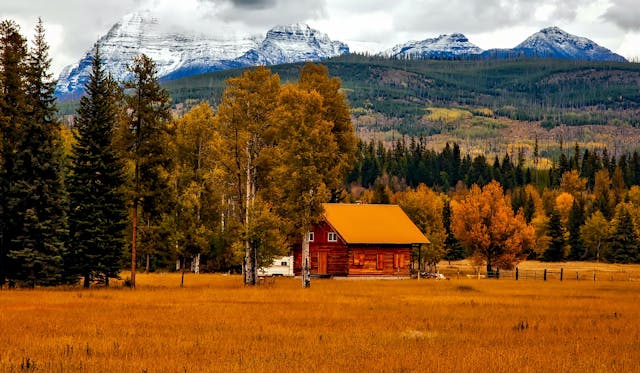Colorado Property Guide: 8 Essential Tips for Buying Land

✅ Key Takeaways
Buying land in Colorado? Learn the 8 crucial considerations to ensure a smart purchase and avoid hidden pitfalls.
- Why it matters: Colorado’s varied landscapes, from mountains to plains, come with complex zoning, water rights, and access challenges that can derail even savvy buyers.
- What to check: Confirm property ownership, zoning/regulations, legal road access, water/septic feasibility, HOA/POA fees, and mineral rights.
- Plus: Understand county rules for sewage, water rights, and whether permits or minimum acreage are required.
- Expert tip: Always do title and tax research, including back taxes and water/mineral rights, and conduct a thorough on-site survey before closing.
TL;DR: Avoid surprises when buying Colorado land, cover ownership, zoning, utilities, and legal access to confidently purchase and build.
Colorado Property Guide: 8 Essential Tips for Buying Land
If you have considered land in Washington or Oregon, you may want to consider land in Colorado as well. It’s a similar mountain getaway, homestead style living, and currently still has prime discounts vs. other states. Colorado offers a lot of opportunity if you know what to look out for. This guide shares eight important tips to help you make a smart, informed decision when buying land in the state.
1. Know Your Purpose Before You Buy
Start by being clear on what you want to do with your Colorado property. Are you planning to build a home, use it for agriculture, or hold it as a long-term investment? This is super important as you will need to match the land type to your requirements. Not all land is created equal, do you want to be local to a city, build a normal suburban home. Or is this is the moment you want that nice ranch with a couple dogs running around. And then even after that, you must really study the zoning laws to make sure you can actually use it for that purpose.
Colorado’s terrain is also diverse, from mountains and forests to flat plains and deserts. Your goals will determine the right location, zoning, and whether utilities are necessary for your style of living. This will lead you to selecting land in certain zones you can narrow your search in.
2. Understand Zoning and Land Use Rules
Zoning laws vary widely across for different types of Colorado property. Some areas allow homes, others are reserved for agriculture, and some have strict limitations. Before making an offer, check with the local county planning office to confirm what’s allowed on the land. Just because the land looks suitable for building doesn’t mean it’s permitted.
If the land is a great price and remote, it will almost always still have some living requirements. Things like sewage are one of the biggest as they don’t want you on the land dumping what they call grey water all over. Which can end up making the beautiful river streams of Colorado toxic.
3. Verify Road Access and Maintenance
Not all land comes with legal or practical access. Some Colorado property are landlocked or only accessible by private easement. Even if there’s a road, it might not be maintained by the county. This could mean having to deal with snow removal or road upkeep yourself. Always confirm that access is legal and usable year-round.
Some of the lower elevation places in Colorado have a really lite stow, but the worry is a heavy snow that can happen at some point. If your roads are not county maintained you can get home locked. To which you need to wait it out, have ample supplies of food, water and fire wood.
Some properties look amazing, there are some high end beautiful ranches out there. And the deceiving part is not far away some beautiful ranch homes. But you will end up finding out that, the land is unbuildable. One big reason for this is fire truck access. If the road is not good enough or they just consider it out of the distance of their coverage zone. The city will completely block using it all all, and Colorado is not the only place.
Many states will do this. Good news is, eventually they figure this out and the land pops in value once it becomes buildable. So it can be quite the investment as long as you have no time frame to use it.
4. Understand Water Rights and Availability
In Colorado, water is heavily regulated and not all land comes with the right to use it. Some properties can’t support a well without a special permit. Others make a well quite easy as the table top levels are decently close to the surface making it cheaper. Others may include water rights, which are valuable but complicated. Always check whether the land includes access to water or if a permit will be required before assuming you can drill a well.
The nice part about Colorado, as long as your decently close to a city or in a populated remote area. Is you can get a top water tank and have a delivery service fill it. This is a very cost effective solution for a monthly cost vs a large one time well cost. Checking the options in the area you are looking in is key.

5. Consider Utilities and Off-Grid Living
If you’re buying rural land, it might not be connected to electricity, sewer, or internet. Find out how far utilities are and what it would cost to bring them in. If you’re planning to live off-grid, consider the cost of solar, a septic system, and satellite internet. Off-grid living has become super popular all over the world though.
This is because people want the ability to survive should a political issue happen. Or disaster, in a large city during a disaster, there’s a good chance people will panic, supplies run out and food becomes scarce. Sadly it could end in many deaths, yet those already self sustainable could wait this out and survive.
Off-grid living is different now, you can live just about the same lifestyle. With advancements in Solar, StarLink satellite providing Internet and even Amazon drone deliveries there’s not much you can’t do while living remote and off-grid. With raw land and a dwelling, there’s no mortgage and aside from what you need to live, your only bill to the state and banks is a small annual property payment. This is a huge opportunity for savings and living free.
6. Check the Terrain and Soil
Land can look perfect at first glance but be difficult or expensive to build on. High elevations, steep slopes, rocky ground, or flood-prone areas can all be challenges. Test the soil if you’ll need a septic system, and review topographic maps or surveys to make sure the land works for your plans. To professionally test your soil, you can use the Colorado State University program to turn in your soil sample here. Soil Test Colorado
7. Look Into HOA and Property Restrictions
Some areas in Colorado, even rural ones, are part of homeowners associations or come with deed restrictions. These rules might limit what you can build, whether you can park an RV, or how you use the land. Always ask for a copy of the covenants or association rules before buying, especially if you’re looking for maximum freedom.
8. Study County-Level Trends and Regulations
Each county in Colorado operates differently. For example, Costilla County is known for affordable remote land, while El Paso County near Colorado Springs has more development and tighter rules. Look into local land values, building requirements, and long-term growth potential. County planning offices are a great resource for this.
Should You Buy Land in Colorado?
Colorado offers a wide range of options for land buyers, but it’s not a one-size-fits-all market. With the right research and preparation, you can find a great deal that fits your goals, whether you’re building a home or buying land as an investment.
If you’re ready to explore affordable land in Colorado with flexible financing options and no credit checks, check out our listings designed for first-time buyers and seasoned investors alike. Colorado Land For Sale
